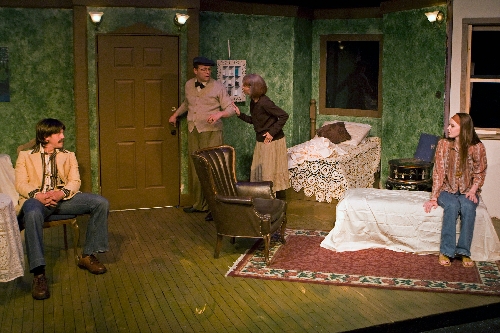Playing a long-dead woman is a head trip in ‘Veronica’s Room’

She’s herself.
Except if she’s not herself.
Or she is herself but thinks she’s not.
Or someone else is who she thinks she might or might not be.
Headache? Think of the migraine she must have.
Spooky-twisty-creepy psychodrama — no surprise from the author of "Rosemary’s Baby" — unfolds onstage starting tonight at Las Vegas Little Theatre’s Black Box. (By the way, it’s BYOB — Bring Your Own Bayer.)
"I want the audience to be grinding their teeth for a while, not really sure what’s going on," says TJ Larsen, director of "Veronica’s Room," Ira Levin’s 1973 head trip. "We want the audience to suffer a bit with the girl."
Flagged with a "spoiler alert" — meaning we can only explain so much, in truth because we couldn’t explain it if we tried — "Veronica’s Room" straddles twin time frames, 1973 in the first act and 1935 in the second.
Levin’s setup: Characters dubbed "Girl" and "Boy" are guests of — wait for it — "Man" and "Woman," caretakers of an old mansion. Startled by Girl’s resemblance to Veronica, the long-dead daughter of the clan they served, the older couple implore her to impersonate Veronica to comfort the family’s only survivor, an addled sister who believes Veronica is still above ground.
Once Girl is decked out in Veronica’s clothes and in her room — well, we’ve been asked to halt right there, as if we understood the rest anyway.
(Just curious: How big a fan are you, dear theatergoer, of incest, murder, necrophilia and insanity? Really into it, or only hobbies? Just asking.)
"First time I read it, I was like, ‘Jesus!’ " says Carla Chiron de la Casiniere, aka Girl. "And 15 minutes later, I’m like, ‘No! Awesome!’ It really messes with your head. You can’t say anymore than that."
Critics could, as did admirers. Playwright/novelist Levin, who died in 2007, was described by Stephen King as "the Swiss watchmaker of suspense novels, he makes what the rest of us do look like cheap watchmakers in drugstores."
Beyond 1967’s "Rosemary’s Baby," that landmark tale of a mom and her little Antichrist, Levin’s hit list includes a slew of classics: "The Stepford Wives," "The Boys From Brazil," "A Kiss Before Dying," "Sliver" and "Deathtrap." (Amusingly, Levin’s debut play was the service slapstick of "No Time for Sergeants," which starred Andy Griffith as a naive hillbilly drafted into the Army — the inspiration for the Jim Nabors sitcom, "Gomer Pyle USMC").
Respected by reviewers, Levin still didn’t entrance everyone with the dread-driven "Veronica’s Room." Back in 2002, The New York Times’ Alvin Klein, commenting on a revival, wrote that Levin was "expanding on a sick joke and a pretentious one at that," with distasteful human aberrations "exploited for titillation and misused as logic."
Others were lured into Levin’s mind-scramble, the Village Voice comparing it to "being trapped in someone else’s nightmare" and The Washington Post calling it "chilling, suspenseful, compelling, spooky, really good."
Pick your critical poison. Yet Levin, as Larsen points out, owned the mystery-thriller gig later bequeathed to movie spook master M. Night "Sixth Sense" Shyamalan, who may have squandered his suspense cred. "He did a fantastic job in one movie and then overdrew his bucket out of the same well too many times, and people got tired of that. But (Levin) was one of the first American generations of it. It’s heavily dependent on mood and atmosphere and those are directorial muscles I want to flex, not necessarily through dialogue but lighting and sound effects."
Claustrophobia and fear should play well within the close quarters of the Black Box, where, Larsen says, Act II requires his leading lady "to start breaking down and examine her own psyche, with the idea that maybe she is going crazy, maybe she did invent the entire first act in her head, pretending to have all this knowledge from the future, but maybe she’s making it up. … I don’t want to make the audience shiver and sweat, but I want them to feel a little bit of what she’s going through."
Thespian-wise? "It’s very high-octane on an emotional level, and it’s hard to keep yourself that high," says Chiron de la Casiniere. "I feel myself getting irritated because it’s so high up. But it’s the ultimate of what I’d like to do, play so many facets of humanity."
Head-thumpers like this do risk bringing out the out-smarters bent on sussing out the puzzle before the pieces snap together, then declaring disappointment because they could. "It’s always a possibility some people will be too cool for school," Larsen says. "But I think the average theatergoer is going to go in with the intention to jump into the pool. We’re going for that WOW! factor."
Fooling audiences? Who does he think he is?
More to the point: Who does she think she is?
Contact reporter Steve Bornfeld at sbornfeld@ reviewjournal.com or 702-383-0256.